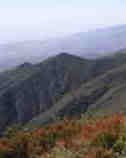
uite "littorally", or would it bode a changing of the tide? The misspelling is purposeful and intentional, by the way ~ "littoral", an adjectival reference to a coastal region; the term "sage" for a scholar and "scrub", the slang usage of the verb, meaning to abandon or drop.
Coastal sage scrub, a scrub land plant community native to the chaparral ecoregion of California, is sometimes referred to as soft chaparral. The ground-hugging aromatic shrubs are able to survive with little available water. How this is possible, varies from one variety to another, but essentially it either involves the plant's ability to preserve moisture.
Coastal sage scrub, a scrub land plant community native to the chaparral ecoregion of California, is sometimes referred to as soft chaparral. The ground-hugging aromatic shrubs are able to survive with little available water. How this is possible, varies from one variety to another, but essentially it either involves the plant's ability to preserve moisture.
 In some species, sclerophyls, leaves have either a waxy coating that holds moisture within the plant, or fine hairy spines that reflect sunlight and thus reduce natural evaporation. Others drop leaves during the very hot months. The sloughing of leaves, and the lack of moisture subject the ecoregion to the ravage of fire. Coastal scrub and chaparral burn intensely; the wax from leaves similar to throwing fat on a flame, and the detritus at the base of the low-lying plants serves as tinder. But, fire, as odd as it may seem, is not the greatest hazard to the region, and in fact serves an important role in the continued survival of the habitat.
In some species, sclerophyls, leaves have either a waxy coating that holds moisture within the plant, or fine hairy spines that reflect sunlight and thus reduce natural evaporation. Others drop leaves during the very hot months. The sloughing of leaves, and the lack of moisture subject the ecoregion to the ravage of fire. Coastal scrub and chaparral burn intensely; the wax from leaves similar to throwing fat on a flame, and the detritus at the base of the low-lying plants serves as tinder. But, fire, as odd as it may seem, is not the greatest hazard to the region, and in fact serves an important role in the continued survival of the habitat.The coastal sage ecoregion in the southern part of California represents the struggle between preservation and human development. While the land in this region is spied by man as a profitable growth area for high-ticket development, this particular ecosystem is relatively rare and the species endemic to the coastal scrub lands diverse. The unique nature of this coastal land and the individual organisms that called it their natural habitat, I suspect, is the reason my online friend, "Doug", chose this location for his summer empirical research project.
Tasks related to wrapping up my corporation were completed by the end of 2005. All that remained was to sell the equipment, and fielding enquiries could be handled by phone and email. Further, activity related to a sale unlikely to begin until the winter snows had melted, when prospects would have the opportunity to fire "her" up and take her for a test-drive. By the beginning of 2006 I found myself in a position where I would have some time on my hands, after nearly two years of nothing but stressful events, yet no specific thoughts on what my next career path would be.
I'd stumbled upon advertisement featured on several biology related job boards on the Internet, for which "Doug" would need 6 field assistants to accompany him to San Diego in mid-March 2006 for a three-month period. I believed that clearing the "cobwebs" of my brain was in order and doing something completely different, for a couple of months, and constructive would be ideal. I prepared to dust off my CV for submission. The ad called for a letter of intent, the curriculum vitae and a list of references.
It had been decades since I applied for a job. This was unlike all I'd ever considered and the $600.00 a month stipend (housing was included), albeit typical for such part-time field work, not the motivator, although, if truth be known it would be welcome, having most of my assets tied up at the time.
My letter was sincere and my various, yet honest, intentions clearly defined. I'd no specific familiarity with his project, but was anxious to learn, enthusiastic to work on something that could be of value to his goals, and would enjoy the chance to be involved in a team-related capacity and, of course, I would be keen to meet him and show him that I was a genuine and caring friend.
I printed the information off my computer, placed it in an envelope and dropped it in the mailbox well in advance of the January 15, 2006 deadline, checking his web page, beforehand, to make sure that positions were still open. Yes! He would continue to advertise vacancies for the field assistants until positions were filled in late February 2006.

No comments:
Post a Comment